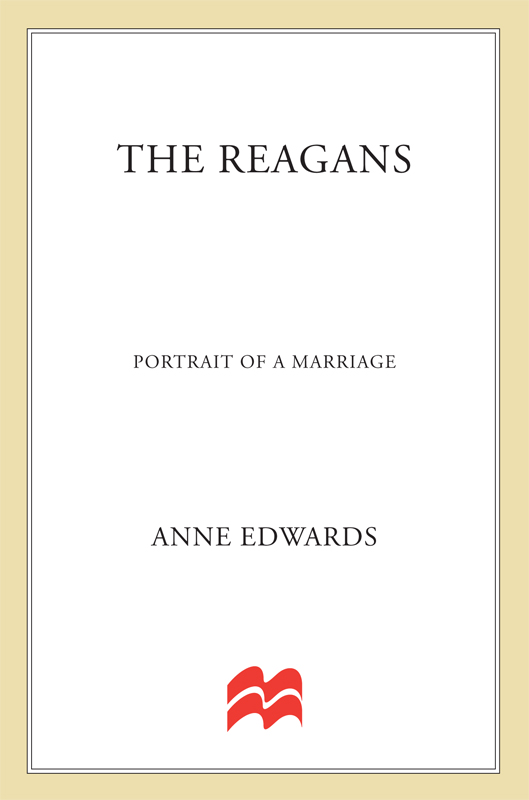
The author and publisher have provided this e-book to you for your personal use only. You may not make this e-book publicly available in any way. Copyright infringement is against the law. If you believe the copy of this e-book you are reading infringes on the authors copyright, please notify the publisher at: us.macmillanusa.com/piracy.
CONTENTS
CHAPTER 1
Enter Nancy
CHAPTER 2
All She Ever Wanted
CHAPTER 3
A Home of Their Own
CHAPTER 4
Corporate Wife
CHAPTER 5
I Love You, Nancy
CHAPTER 6
On the Campaign Trail
CHAPTER 7
The Governors Lady
CHAPTER 8
The Years Between
CHAPTER 9
On the Steps of the White House
CHAPTER 10
Marching into History
CHAPTER 11
Meet the Press
CHAPTER 12
Oh, God! Its Happening Again!
CHAPTER 13
Aftermath
CHAPTER 14
Just Say No
CHAPTER 15
A Death in the Family
CHAPTER 16
The Power and the Glitter
CHAPTER 17
Facing the Demons
CHAPTER 18
The Best of Times and the Worst of Times
CHAPTER 19
A Graceful Exit
CHAPTER 20
Life Continues, Memory Fades
FOR
Maxwell Edwards Sadler
Casey Edwards Sadler
Hillary Anne Edwards
Liza Elaine Citron
Aaron Lieb Citron
The Future
CHAPTER ONE
ENTER NANCY
One evening in mid-February 1952 Edith Luckett Davis and Dr. Loyal Davis, parents of thirty-year-old Hollywood contract player Nancy Davis, were sitting down to eat dinner at their Scottsdale, Arizona, home when the telephone rang. Edith answered it. Ronald Reagan, a forty-one-year-old divorced movie star of waning celebrity, and father of two, was on the line.
He asked me for Dr. Loyal Davis and I said who wants to speak to him and he said Ronald Reagan, Edith, a onetime touring road actress known for her out-front responses, recalled. I thought what the hells he doing calling Loyal? I didnt know what it was for. I said, Just a minute. I went in and said to Loyal, Ronald Reagan wants to speak to you. And he said, Me? And I said, Get to that phone cause I want to know what in hell he wants. Anyway, Loyal went to the phone. He said, Thats interesting [in answer to Reagans admission that he wanted to marry Nancy]. Are you sure you can [support her]? Yes [when Reagan asked if he approved]. And they talked and after [they hung up] Loyal said to me, He wants to marry Nancy. And I said, Oh, go on! He said, No, Im not kidding. He wants to marry Nancy. And I said, Thats very exciting, very exciting.
Then she called and I said, Why in hell is that man calling your father for this? And she said. We want to get married but dont want to marry unless you and Daddy want me to. And I said, Of course. If hes a nice guy and you like him, then Im sure its all right. And she said, He is, youll love him. I said, Find out what you want for a wedding present. It cant be extravagant, but I want you to have what you want. She called back [in a little while] and said, Ill tell you what we want. We want a camera that can take moving pictures and a screen that we can show them on, and thats all we want. And I said, Sold.
It seems probable, due to her emotional attachment to Reagan at this point, that Nancy would have married him despite any objections Dr. Davis might have raised. But for Reagan at his age to make a call to Nancys elderly parents seeking permission for him to marry their mature daughter exhibits Nancys early influence over him and the strength of his feelings for her. She had urged him to do so despite his initial reluctance. For her entire life Nancy had sought approval from her parentsthe mother who left her with relatives as a small child to go on the road with a theater troupe, and the father who made her wait years before he adopted her so that she could legally bear his name.
* * *
Nancy Davis was born Anne Frances Robbins in New York City on July 6, 1921. Edith was fond of saying that Nancy was supposed to be born on the Fourth of July, but the Yankees were playing a doubleheader that day, and being a die-hard fan, she delayed the birth for two days. Edith was a plainspoken woman who peppered her Southern-inflected speaking voice (she came from Petersburg, Virginia) with gritty phrases, and very often four-letter words. She had been on the stage from the age of three, then quit school in the tenth grade and joined a stock company. Her chief assets were a pretty face and a well-turned ankle, but Edith quickly picked up the tools of her trade, an ability to learn her lines and speak them clearly and to move on stage with confidence. She developed into a creditable actress and for the next decade traveled up and down the East Coast with various companies, playing supporting roles in plays that starred better-known performers: Walter Huston, Louis Calhern, and Alla Nazimova, a highly stylized actress of the stage and silent screen who had been trained in Russia by the great theater producer (and originator of the Stanislavsky method of acting), Konstantin Stanislavsky, and became known by the use of only her last name. Edith and Nazimova were friends, and when Edith gave birth to her daughter, she asked the ofttimes bizarre older woman to be the childs godmother.
Nancys father, Kenneth Robbins, was a shoe salesman from Pittsfield, Massachusetts, with claims of attending Princeton and of being the scion of a rich family who had come upon hard times but were still well-off. It seems this was mostly untrue. The Robbins family had never had great wealth and were just scraping along; moreover, the Princeton archives do not list Kenneth Robbins as either a graduate or former student. Nonetheless, his parents, Anna and John Robbins, did not approve of their son consorting with an actress who was five years his senior, and whoat the advanced age of twenty-seven and still unmarriedhad no doubt led a less than prim, virginal life. Robbins possessed a certain charm and a persuasive manner; he also boasted that he would be heir to a comfortable estate upon the death of his terminally ill father. Edith was determined to marry him, and marry him she did, and quit the stage. A year later John Robbins died, and the inheritance his son had promised Edith turned out to be a pittance.
It was a miserable marriage, filled with resentment, and a hardscrabble life. Ken tried his hand as a theatrical booking agent but was unable to find any clients. While he later joked that he represented a one-legged tap dancer and a cross-eyed knife thrower, that seems to have been an example of his style of humor. When America entered World War I in 1917, he enlisted in the army and left Edith to cope for herself in New York. Edith managed by returning to the stage, appearing in supporting roles in several Broadway shows. When Ken returned in January 1919, they set up housekeeping together again in New York City. Ken hated the city and the theater, and in the next two years had a succession of jobs that did not pay enough to cover their rent. He insisted that Edith return with him to Pittsfield where he thought he could find gainful employment working on cars, something he enjoyed doing. Edith refused to go. She was three months pregnant with Nancy, but he left her anyway.
Nazimova and other friends came to Ediths financial rescue, and as soon as she was able, she joined a touring company carrying the daughter she now called Nancy in a cradle fashioned from a wicker laundry basket. When Edith was giving a performance, Nancy was left in the care of other players, stage managers, and people at the rooming houses where they stayed. In two years Edith had performed in forty-two plays in almost as many cities, playing everything from the mother in Little Lord Fauntleroy to Michaela in a nonmusical version of Carmen.









